Google Pixel 8a vs Pixel 8: So, why does the Pixel 8 cost $200 more?
We may earn a commission if you make a purchase from the links on this page.

Intro
The Pixel 8a’s debut has sparked plenty of debate. While many expected a bold leap from last year’s Pixel 7a, Google instead delivered a more polished evolution. But make no mistake—the 8a holds its ground as an impressive contender, arguably boasting a significantly better bang for the buck in comparison with the Pixel 8!
Both the Pixel 8 and 8a come with vibrant displays, solid performance, and nearly identical camera systems. Where the Pixel 8 pulls ahead is in its larger battery, faster charging, and sleeker design. Of course, these perks come at a $200 premium, raising the big question: are they worth the splurge?
To help you decide, we break down the key differences between the Pixel 8 and 8a. Whether you’re looking for value or a touch of luxury, we’ll help you figure out which one fits your lifestyle—and your pocket.
Oh, and here’s a curveball: the Pixel 9 series is already here, bringing four new devices into the mix—Pixel 9, Pixel 9 Pro, Pixel 9 Pro XL, and Pixel 9 Pro Fold. Curious how the latest stacks up? We’ve also compared the Pixel 9 to both the Pixel 8a and Pixel 8 to help you stay ahead of the curve.
Oh, and here’s a curveball: the Pixel 9 series is already here, bringing four new devices into the mix—Pixel 9, Pixel 9 Pro, Pixel 9 Pro XL, and Pixel 9 Pro Fold. Curious how the latest stacks up? We’ve also compared the Pixel 9 to both the Pixel 8a and Pixel 8 to help you stay ahead of the curve.
Pixel 8a vs Pixel 8 differences:
| Google Pixel 8a | Google Pixel 8 |
|---|---|
| Smaller 6.1-inch OLED display with 120Hz refresh rate, up to 1400 nits of max brightness | Slightly larger 6.2-inch OLED display with 120Hz refresh rate, 1400 nits of max brightness |
| Smaller battery (4,492mAh) and slower charging (18W wired, 7.5W wireless | Larger battery (4,575mAh) and faster charging (27W wired, 18 wireless) |
| 64MP+13MP cameras, 13MP front | 50MP + 12MP cameras, 10.5MP front |
| Great water and dust resistance (IP67) | Better water and dust resistance (IP68) |
| Starting price of $499 | Starting price of $699 |
Table of Contents:
Read more:
- Google Pixel 8a release date, pricing, features, and specs
- Google Pixel 8 review: doing things the Google way
- Google Pixel 8a vs OnePlus 12R
- Google Pixel 8a vs iPhone 15: Has the iPhone found its budget nemesis?
- Google Pixel 8a or Samsung Galaxy S24 FE: What are the differences
Design and Display Quality
Slight changes
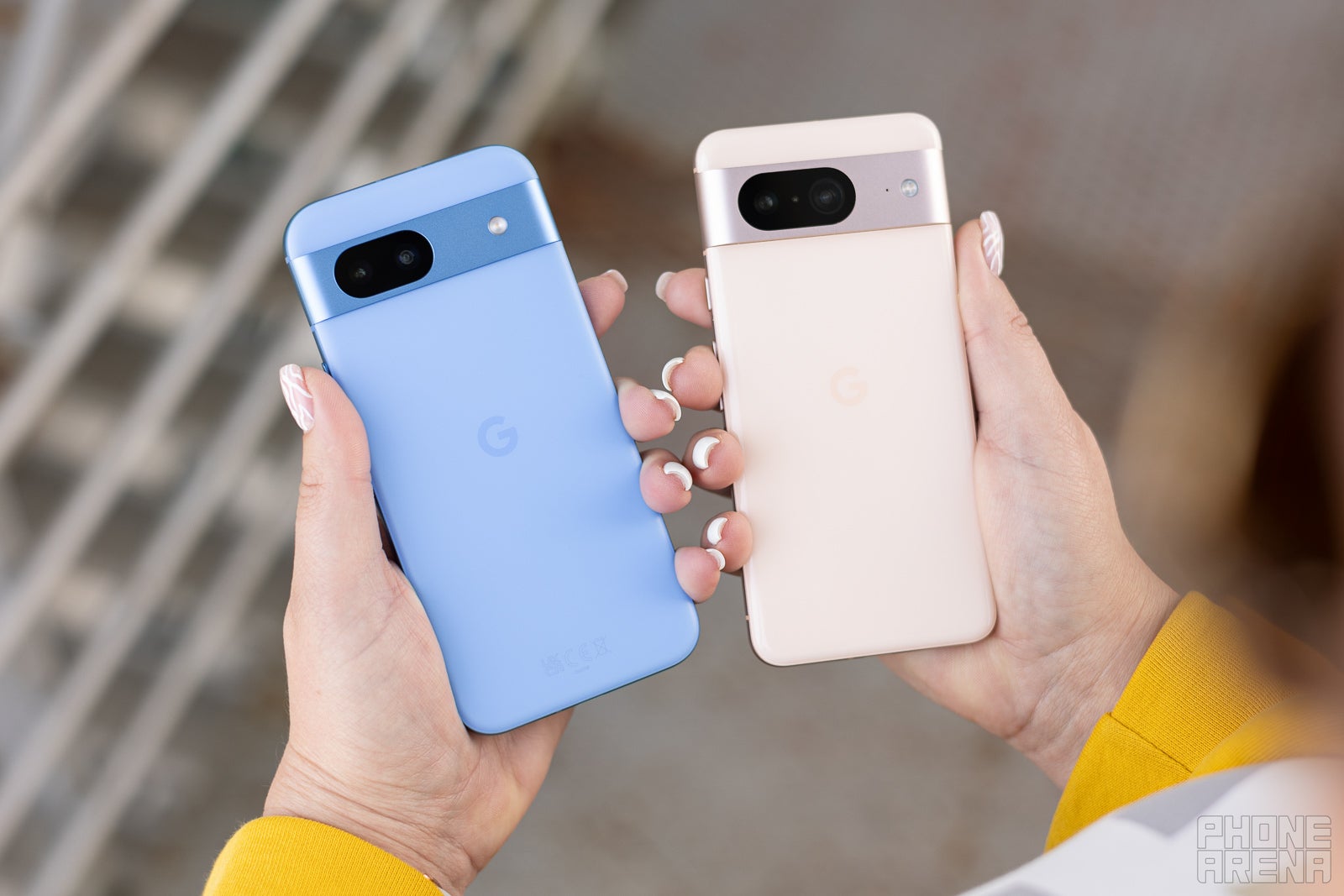
The Pixel 8 relies on a slightly more premium exterior design (Image by PhoneArena)
There are some differences between the Google Pixel 8a and the Pixel 8 as far as design goes. While the design language is understandably similar on both devices, the Pixel 8a has slightly more rounded corners and thicker bezels, more appropriate for its mid-range status. Meanwhile, the Pixel 8 is the sleeker and more premium device, albeit this might not be of such a significant importance for everybody.
The Pixel 8a has a 6.1-inch screen, whereas the Pixel 8 boasts a slightly larger screen at 6.2 inches. However, while this may suggest that the Pixel 8 is the physically larger device, that's not true. The flagship stands is shorter and narrower than the Pixel 8a, while the weight and the thickness of the two devices are mostly similar.
The Pixel 8a now has a matte composite back with matte aluminum frame, while the Pixel 8 relies on a sturdier Corning Gorilla Glass Victus back and also has a matte aluminum frame.
Another difference is the water and dust resistance on both: while the Pixel 8a is an IP67 device, the Pixel 8 has a better IP68 water and dust resistance, so it's technically better-protected against the elements and any accidental damage. While this might not seem like such a major difference, with the Pixel 8 you have a better peace of mind that the device will endure rougher play.
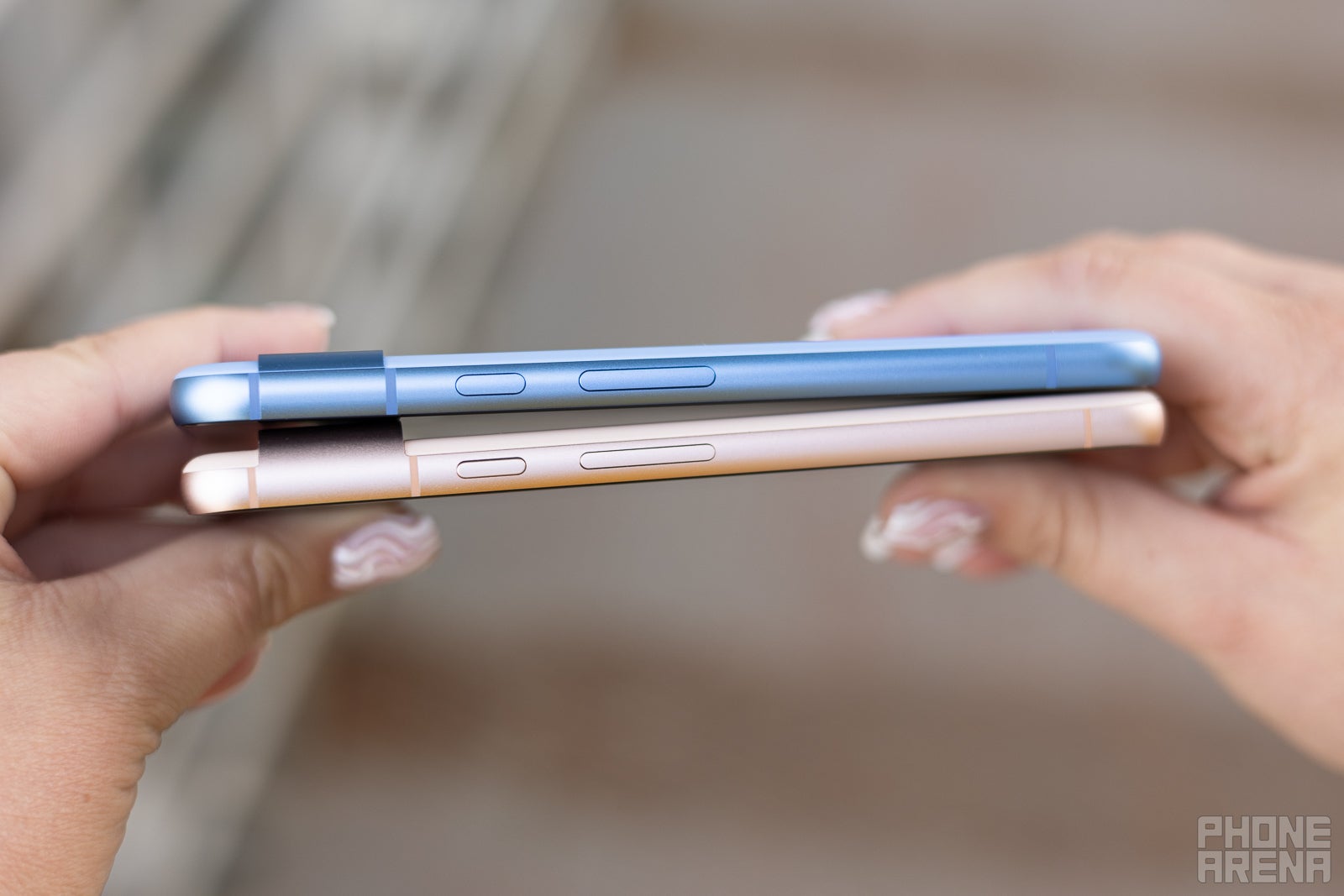
Two of the more compact Android phones right now (Image by PhoneArena)
In terms of colors, the Pixel 8a is available in Obsidian (black), Porcelain (white), Bay (blue), and Aloe (green). Meanwhile, the Pixel 8 can be yours in Obsidian (black), Hazel (silver), Mint (green), and Rose (rose).
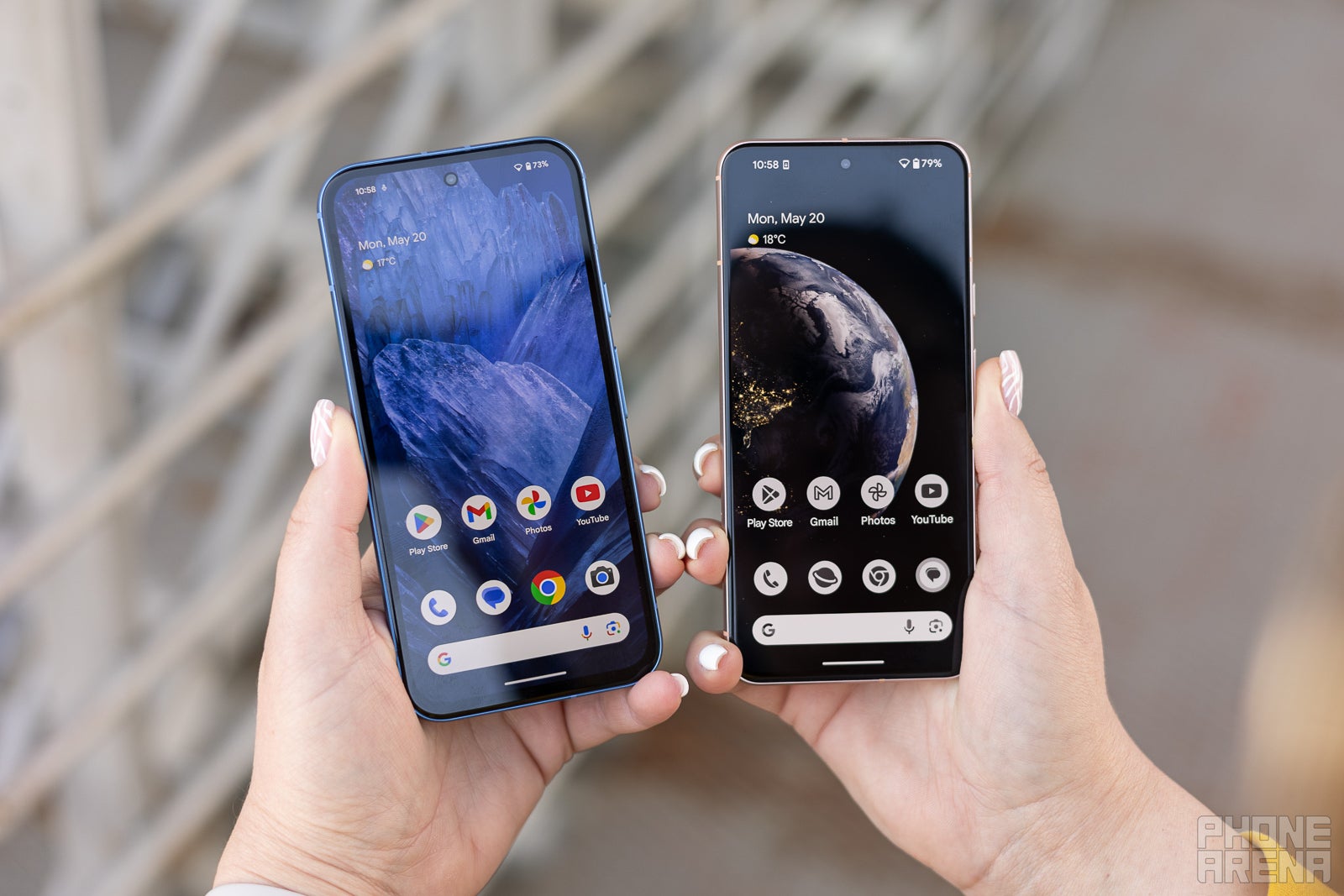
Both phones are retina scorchers with extremely bright screens (Image by PhoneArena)
The Pixel 8a display isn't that much different from the Pixel 8 as far as hardware properties are considered, even despite the 0.1-inch size difference.
Both phones have OLED screens with a sensible FHD+ resolution, which is more than enough to deliver decent sharpness on such a display size. Surprisingly, the Pixel 8a and the Pixel 8 feature the same 120Hz screen refresh rate, which makes interface navigation super-smooth and rewarding, as is the current standard for phone displays. This eliminates one of the advantages the Pixel 8 had in store, which is superb news for the Pixel 8a and all of its potential owners. Another change is the maximum display brightness of 1,400 nits in HDR mode and 2,000 nits of peak brightness on both devices.
How do the phones compare in our in-house benchmarking test, which are conducted in a controlled environment?
Display Measurements:
Well, the Pixel 8a achieves slightly higher brightness in our own display benchmarks, beating its flagship rival by a little. Aside from that, both phones score similar display properties, with nearly equal color temperature, contrast, and color reproduction, which is more great news for the Pixel 8a. This means that you're not gaining or losing much by chossing one over the other.
Biometrics-wise, the Pixel 8a doesn't improve the Pixel 7a's somewhat lackluster and slow-to-react fingerprint scanner that's built into the display. The Pixel 8's fingerprint sensor works faster and rarely throws erroneous fingerprint readings.
Performance and Software
Pixel 8 edges a lead
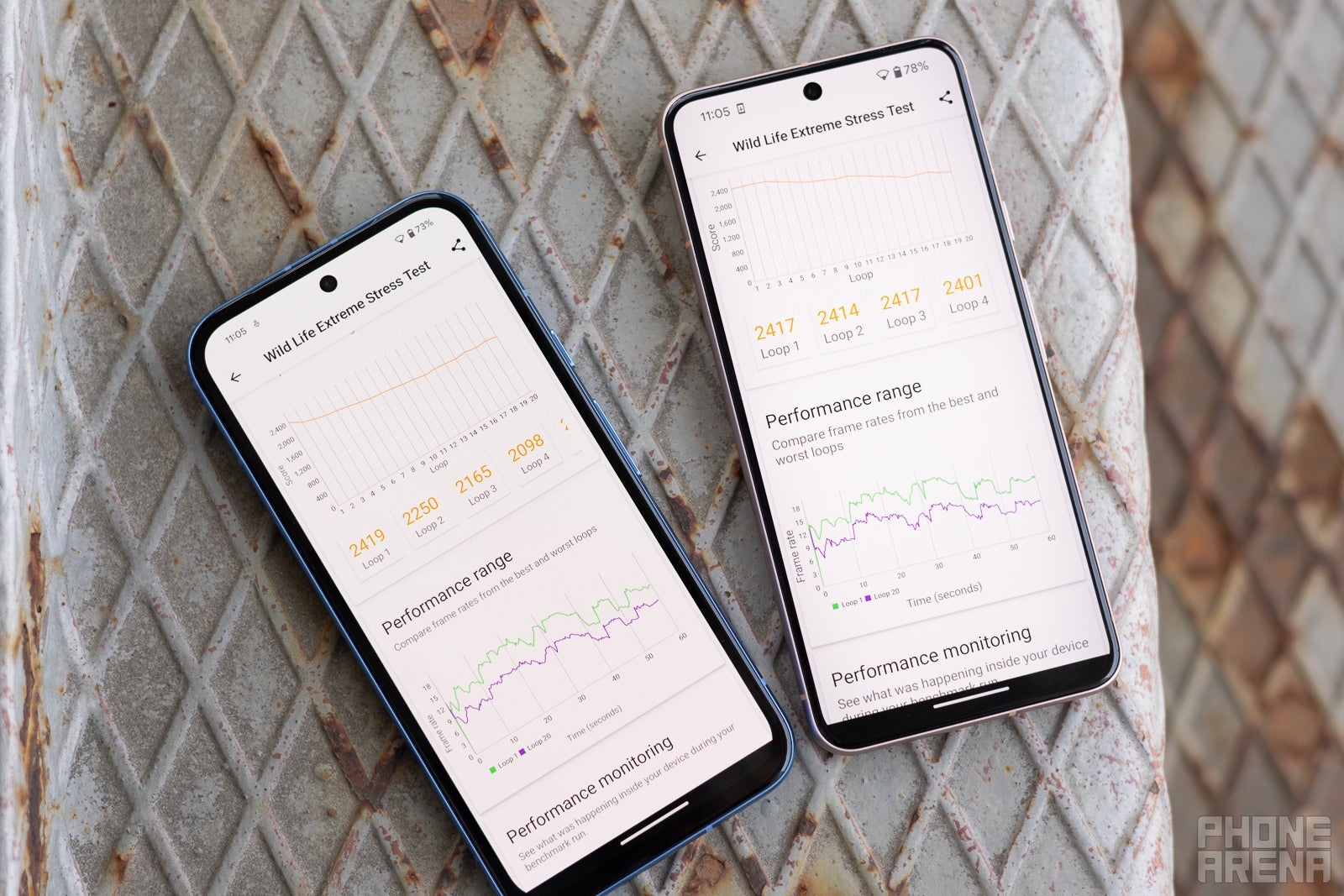
The flagship (Image by PhoneArena)
The Pixel 8a comes along with the Tensor G3 chip that's also ticking inside the Pixel 8 and Pixel 8 Pro. As far as everyday performance goes, the Tensor line of chips, the Tensor G3 included, are all more than enough to ensure a decent performance for most tasks. The Tensor G3 lacks the raw performance in synthetic benchmarks, whereas most of the competition (Snapdragon 8 Gen 3, Apple A17 Pro) has the upper hand.
As per our benchmark tests, which were all done in-house, the Pixel 8a and the Pixel 8 are mostly neck and neck in both the CPU-heavy Geekbench 6 and the GPU-tasking 3DMark Extreme stress tests. Definitely no surprises here, as both phones have the same chipset, so it's normal to expect similar real-life performance.
RAM and storage-wide, the Pixel 8a comes with 8GB of RAM as well as 128GB and 256GB of native storage. Surprise, surprise, that's similar to the Pixel 8, which doesn't give a particularly good outlook for the flagship.
Android 15 arrived to both the Pixel 8a and Pixel 8 in mid-October 2024, delivering the latest software available from Google. Granted, the latest Android isn't groundbreaking in any way, shape, or form in comparison with Android 14, just the yearly user experience and interface polish that we've now come to accept rom Google.
Camera
The Pixel 8a will probably match the Pixel 8
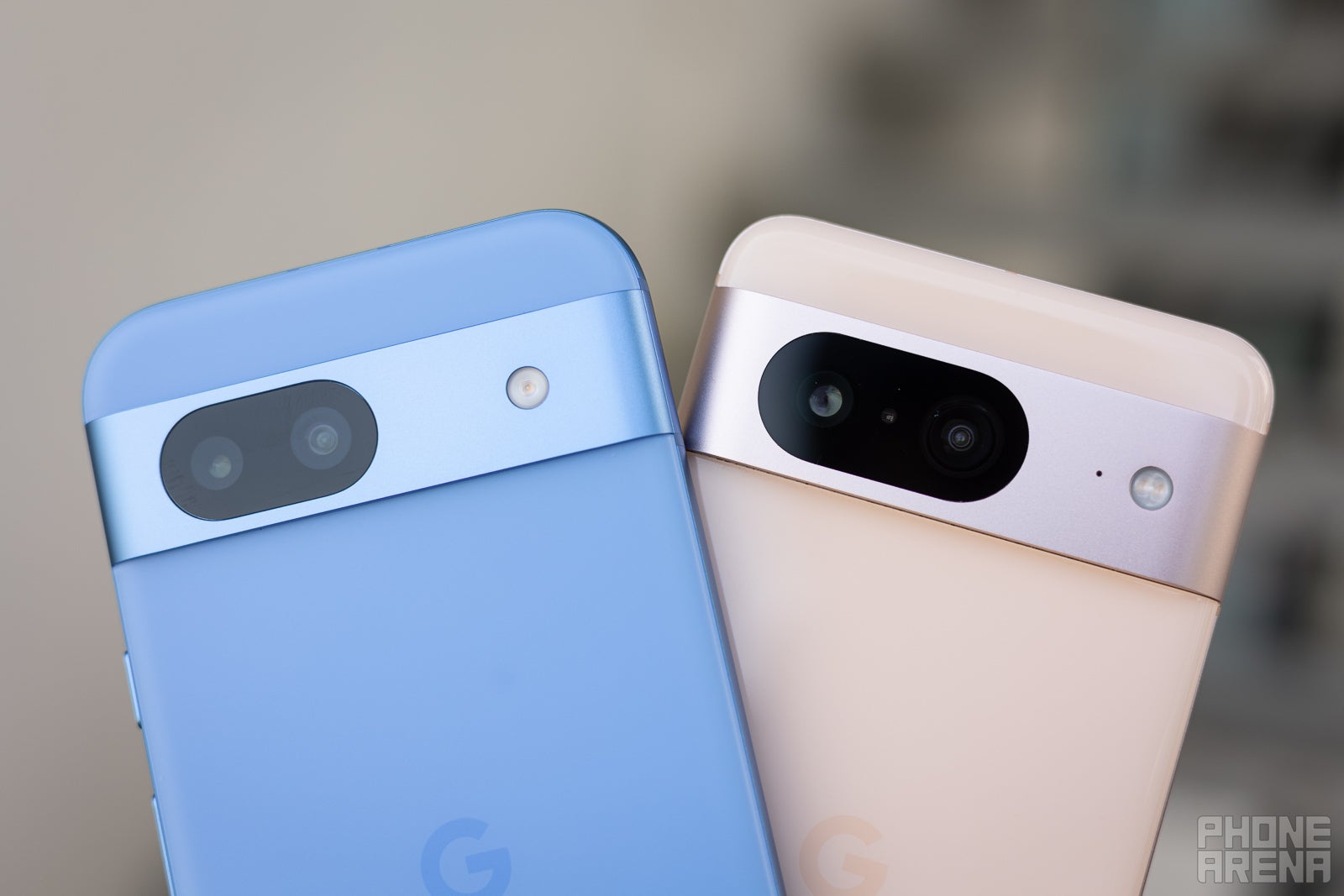
Pixel 8a vs Pixel 8 (Image by PhoneArena)
While it may seem that the Pixel 8a has a more capable camera setup than the Pixel 8 as it wins the megapixel race, this might be far from true. Then again, it might be not.
See, the Pixel 8a has the same 64MP wide and a 13MP ultra-wide cameras that debuted with the Pixel 7a, as well as a 13MP front-facing camera. Both the Pixel 8a and the Pixel 7a deliver mostly similar image quality, as evident in our comparison.
Meanwhile, the Pixel 8 comes along with a 50MP wide and a 12MP ultra-wide camera, as well as a 10.5MP selfie snapper. While the difference may seem in favor of the Pixel 8a, hardware is just part of the whole picture. In fact, with Pixels, the majority of camera improvements usually stem from software enhancement, image-processing upgrades, and lots of AI/ML goodies, so hardware doesn't play such a major part here.
In any case, we expect that the Pixel 8a to deliver excellent image quality, but the Pixel 8 should have a slightly upper hand in terms of overall scene dynamics and low-light performance.
Main Camera
The Pixel 8 has slightly better detail resolve, as well as marginally more pleasing color temperature, especially in the facial tones. However, the Pixel 8a performs mostly similar in terms of image quality.
Not many differences in lower light, either. Both phones deliver crisp detail and decent dynamics. A major win for the Pixel 8a.
Zoom Quality
When it comes to zooming, it's natural to expect the Pixel 8 to zoom in better than the Pixel 8a, although both phones support the same digital 8x Super Res zoom. With the Pixel 8 you get a much clearer detail, as well as much more natural color rendition. The Pixel 8a delivers smudged details as well as a tangible yellow-ish tint.
Ultra-wide Camera
In daylight conditions, the Pixel 8a's utlra-wide camera has slightly more exposed dynamics, whereas the Pixel 8 is grittier and more dramatic with a slightly colder undertone. Both capture tons of scene, but the Pixel 8 has much less distortion, especially in the center of the frame.
At night, the Pixel 8a holds its ground and actually performs slightly better in this particular scene. The image captured with the Pixel 8a is totally on par with the one from the Pixel 8, if not better.
Selfies
The Pixel 8 delivers more detail in the selfies, as well as more natural colors. With the Pixel 8a, we get slightly more exposure in the facial area, which looks good, but the Pixel 8 is more accurate to depict real life.
Audio Quality and Haptics
The audio quality of Pixel 8 is crystal clear and adequate for listening to any speech-related material. The overall sound profile does seem to lack a bit when it comes to richness and depth, so you probably won't be able to replace a portable speaker with this phone. The Pixel 8a employs the same stereo-speaker setup as its predecessor, which delivered very decent sound, albeit slightly lacking in the lower frequencies.
Haptics-wise, the Pixel 8a delivers the same haptics feedback as its predecessor: not particularly strong, but not mushy either. Meanwhile, the Pixel 8 definitely has that extra level of strength and preciseness that makes its haptic feedback nicer to interact with.
Battery Life and Charging
Potential massive bump for the Pixel 8a
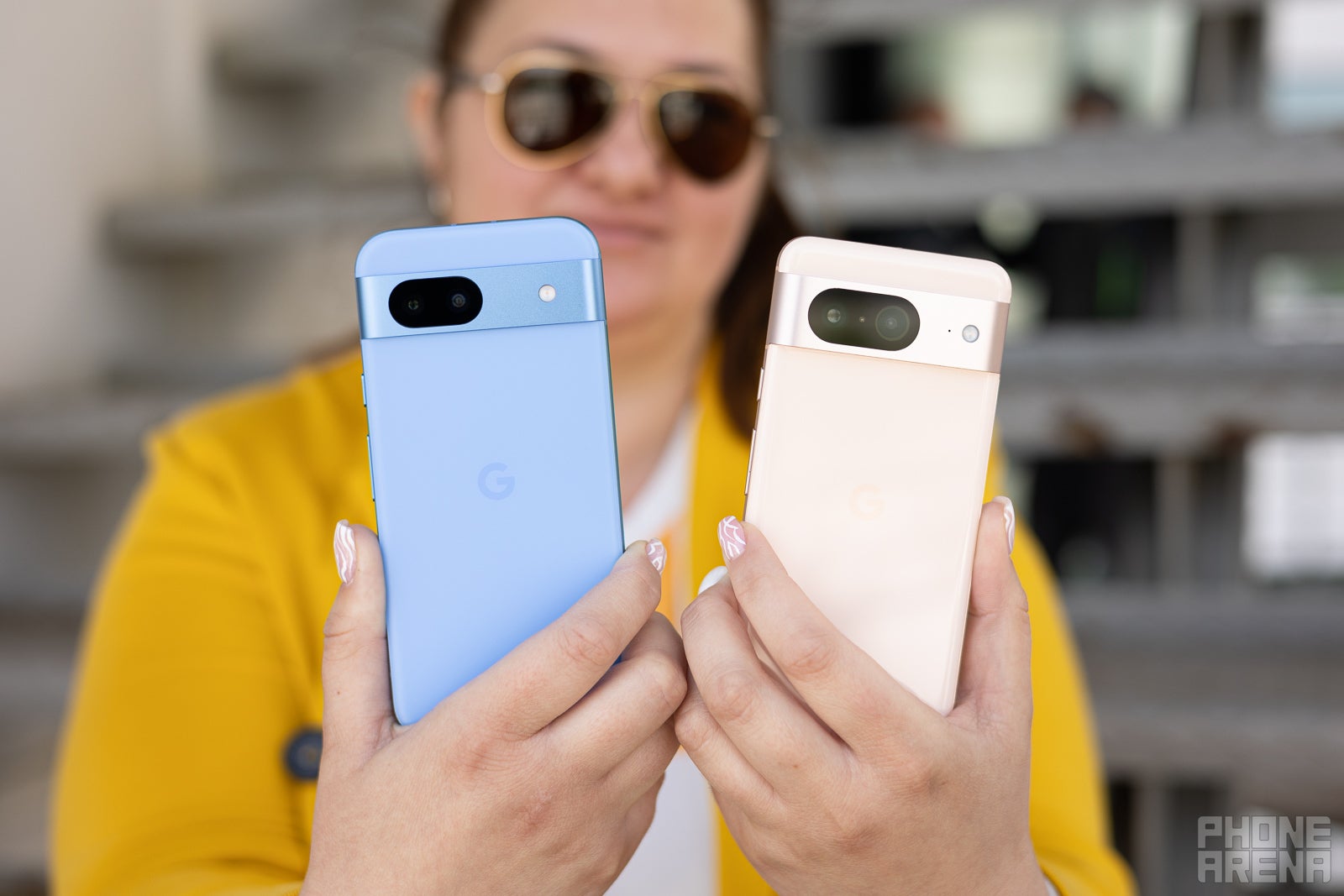
Pixel 8a vs Pixel 8 (Image by PhoneArena)
The Pixel 8a comes with a 4,492mAh battery, a notable bump over the Pixel 7a's 4,385mAh battery. Meanwhile, the Pixel 8 boasts a 4,575mAh battery, which helps the phone achieve better than the average battery endurance.
Our battery benchmark tests reveal that the Pixel 8 generally outlasts the Pixel 8a, except when it comes to 3D gaming. In our web browsing test, designed to mimic everyday usage, the Pixel 8 holds on for an impressive hour and forty minutes longer than the Pixel 8a. Similarly, in our custom video streaming test, the Pixel 8 edges ahead with an extra hour of battery life. Interestingly, the Pixel 8a manages to pull ahead slightly in 3D gaming, showcasing its unique strength in that area.
The Pixel 8a doesn't improve on the Pixel 7a's 18W wired or 7.5W wireless charging, which are both painfully slow and take a long time to fully top up the phone. The Pixel 8 will win this one, as it charges at up to 27W via cable and up to 18W wirelessly. This difference in charging speed is clearly in the Pixel 8's favor, which achieves a full charge in roughly 80 minutes.
Specs Comparison
Below, you will find a summary of the Pixel 8a vs Pixel 8 specs:
| Google Pixel 8a | Google Pixel 8 | |
|---|---|---|
| Size, weight | 152.1 x 72.2 x 8.9mm, 188gr | 150.5 x 70.8 x 8.9 mm, 187gr |
| Screen | 6.1" FHD+ OLED 120Hz | 6.2" FHD+ OLED 120Hz |
| Processor | Tensor G3 | Tensor G3 |
| RAM, Storage | 8GB/128GB 8GB/256GB | 8GB/128GB 8GB/256GB |
| Cameras | 64MP main 13MP ultra-wide 13MP front | 50MP main 12MP ultra-wide 10.5MP front |
| Battery | 4,492mAh | 4,575mAh |
| Charging | USB-C 18W wired, 7.5W wireless | USB-C 27W wired, 18W wireless |
Summary
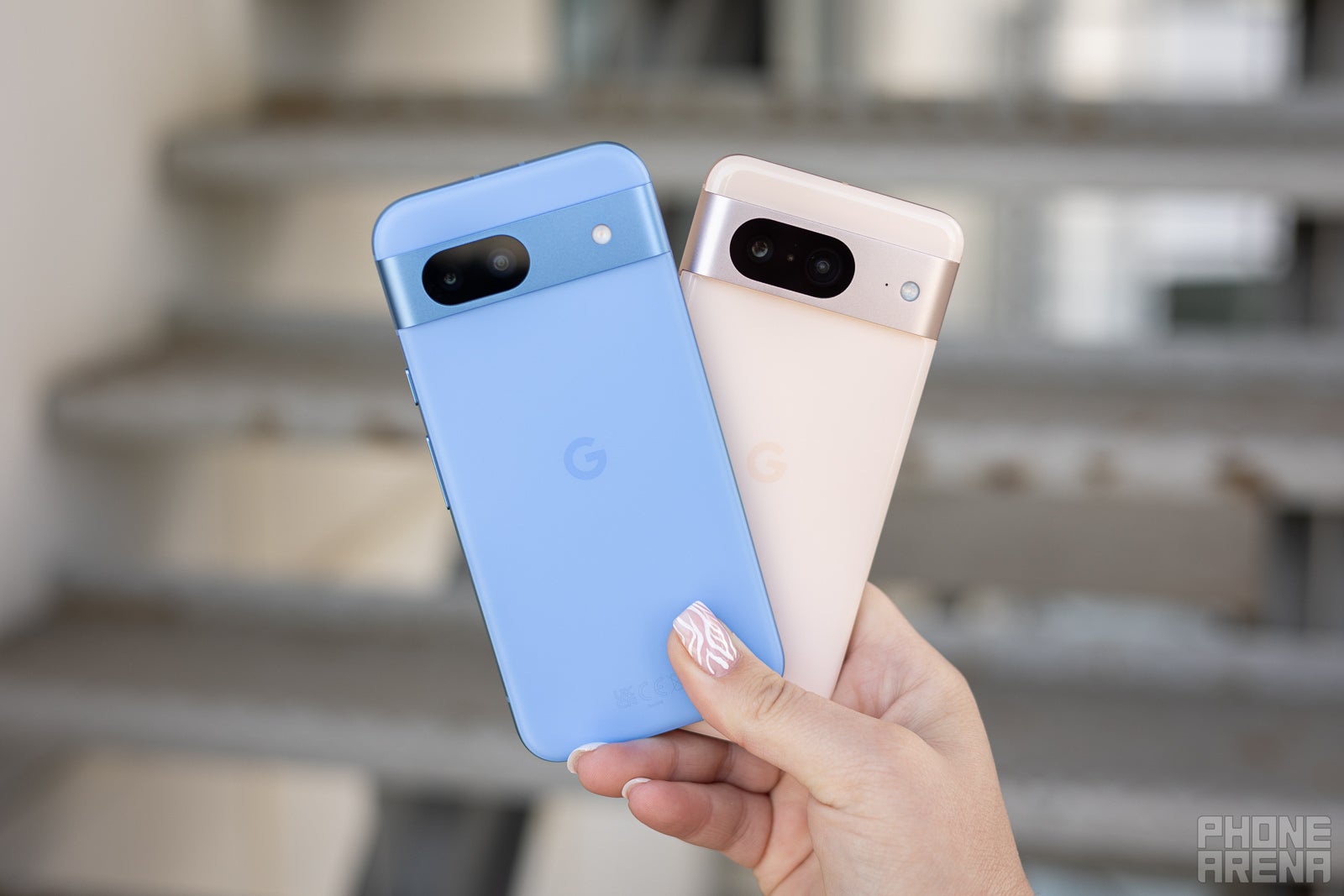
Pixel 8a vs Pixel 8 (Image by PhoneArena)
The Pixel 8a is certainly another extremely competitive mid-ranger by Google, and depending on who you ask, a case could be made that the Pixel 8a is potentially a better phone than the Pixel 8.
It certainly is the better-value device, boasting 90% or more of the same features that the Pixel 8 comes along with, sans the slightly faster charging and better graphics performance. With a $499 starting price, getting the Pixel 8a over the $699 Pixel 8 is a sensible move in this day and age.
Should you "upgrade" from the Pixel 8 to the Pixel 8a? Well, no, such a move would make no sense. However, if you're in the market for a very adept Android phone without any major issues with ton of value, it's the Pixel 8a that should be considered instead of the Pixel 8, which has little to differentiate itself from the affordable phone.
Follow us on Google News


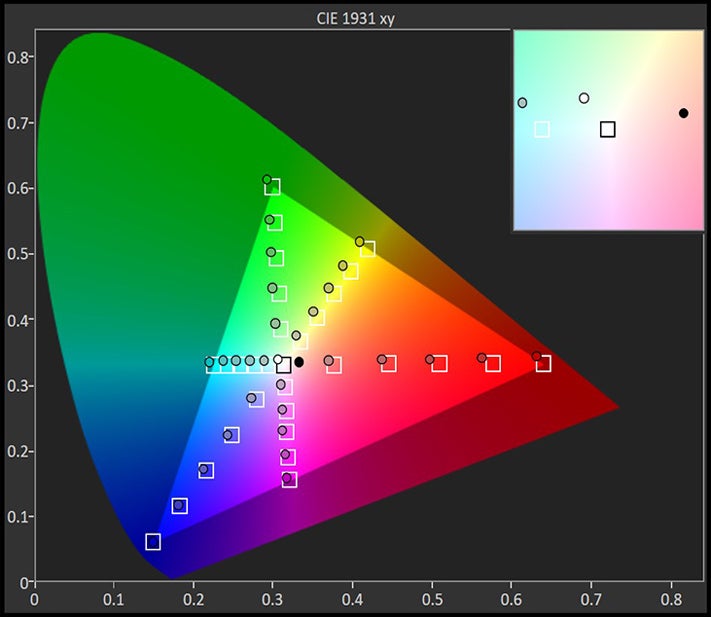
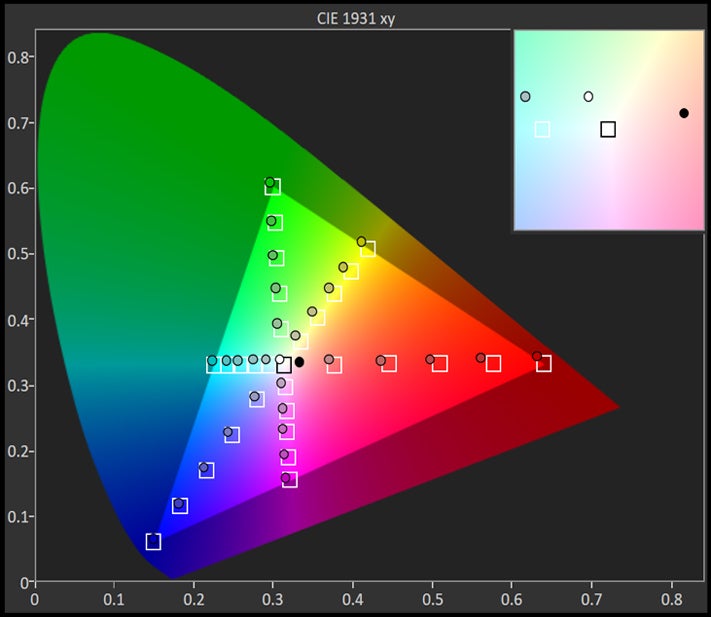






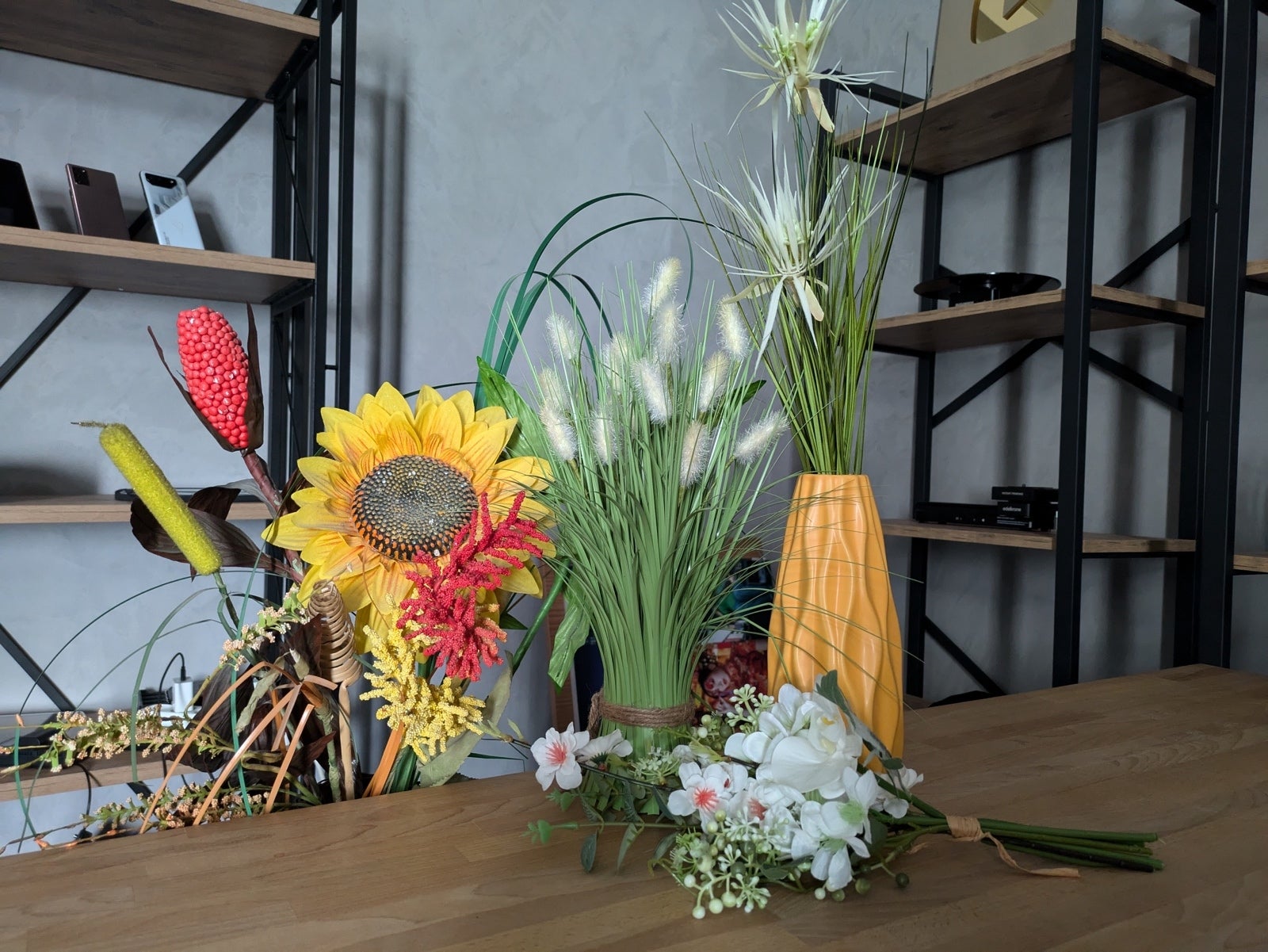
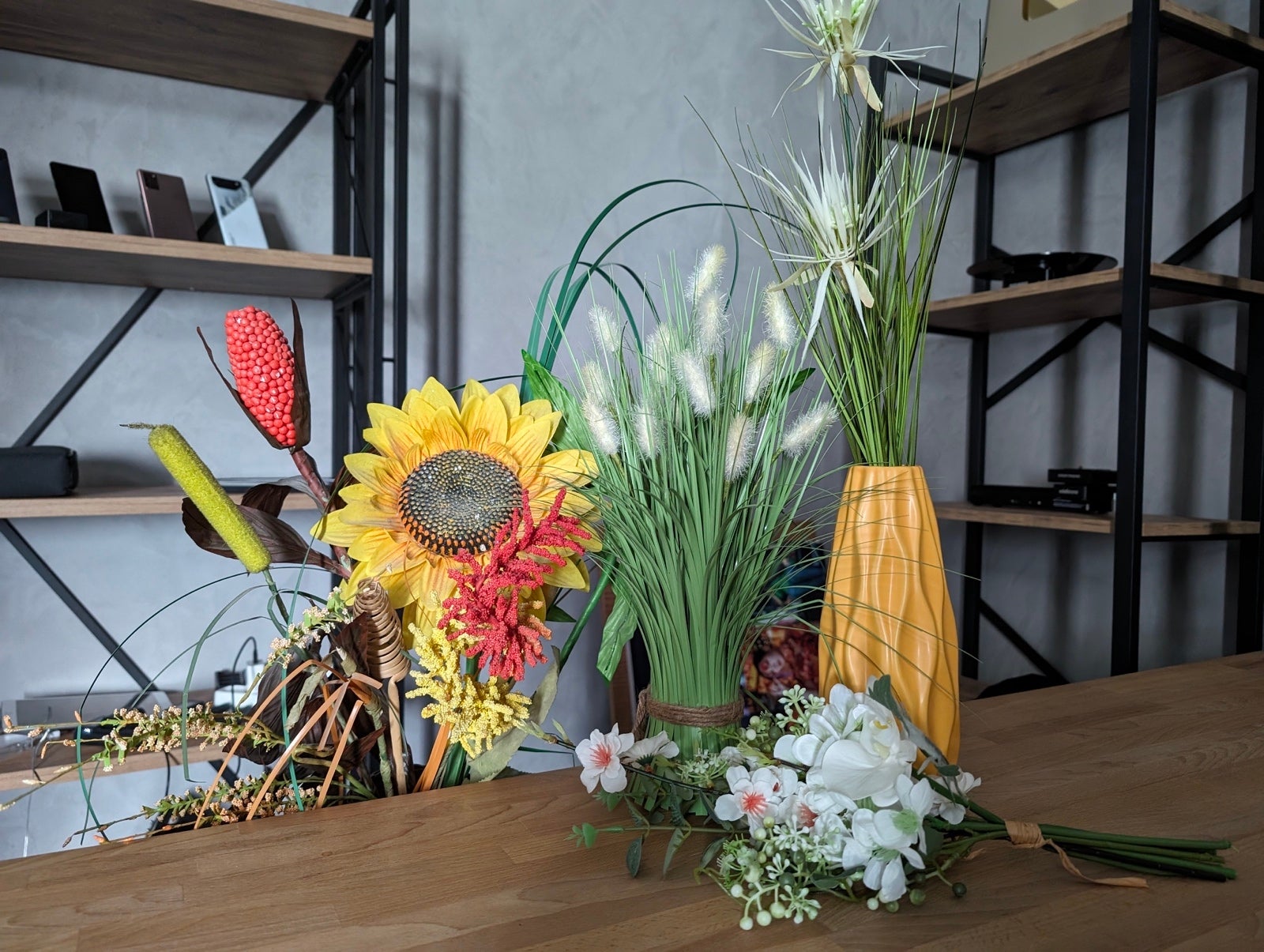
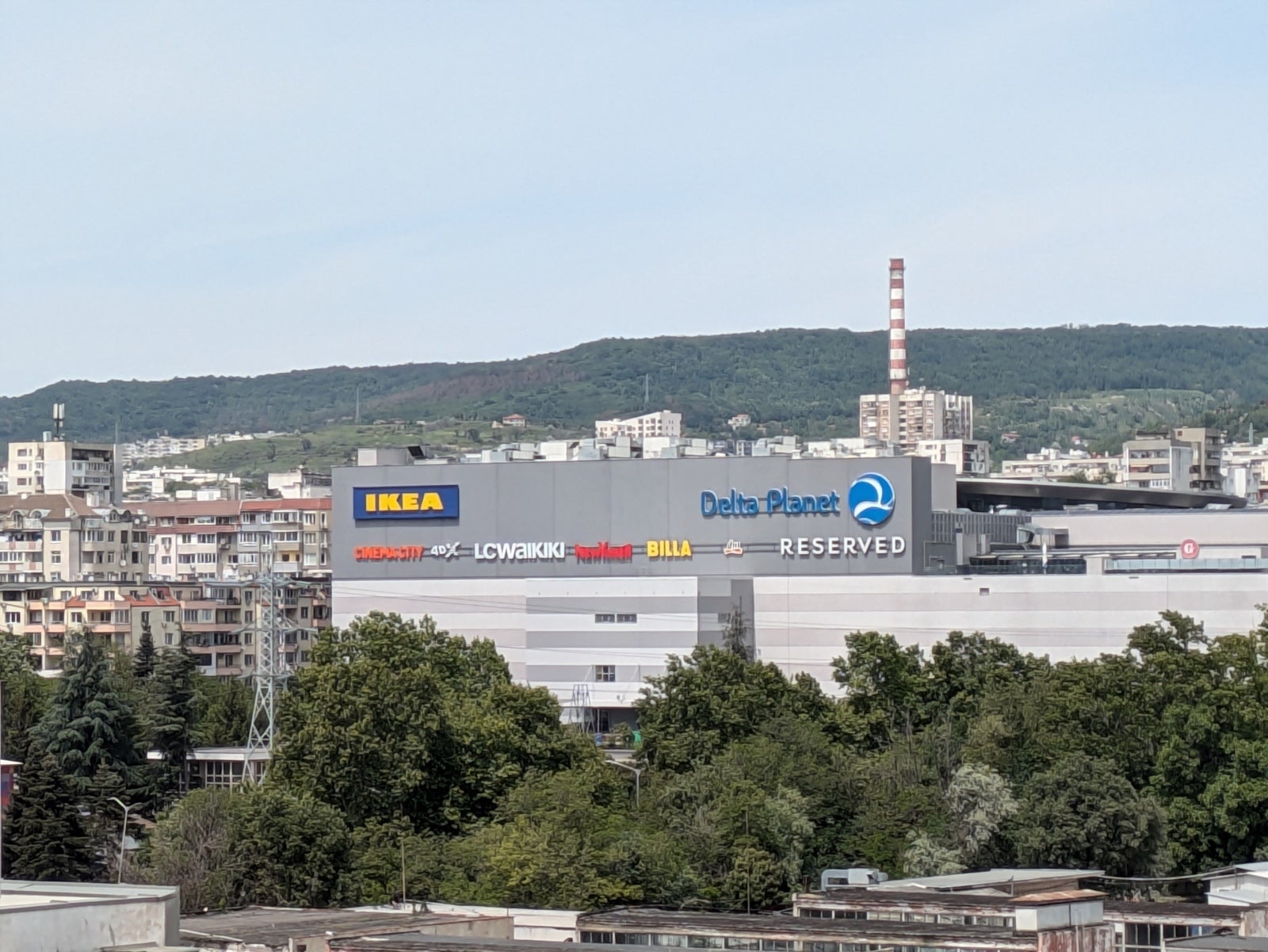
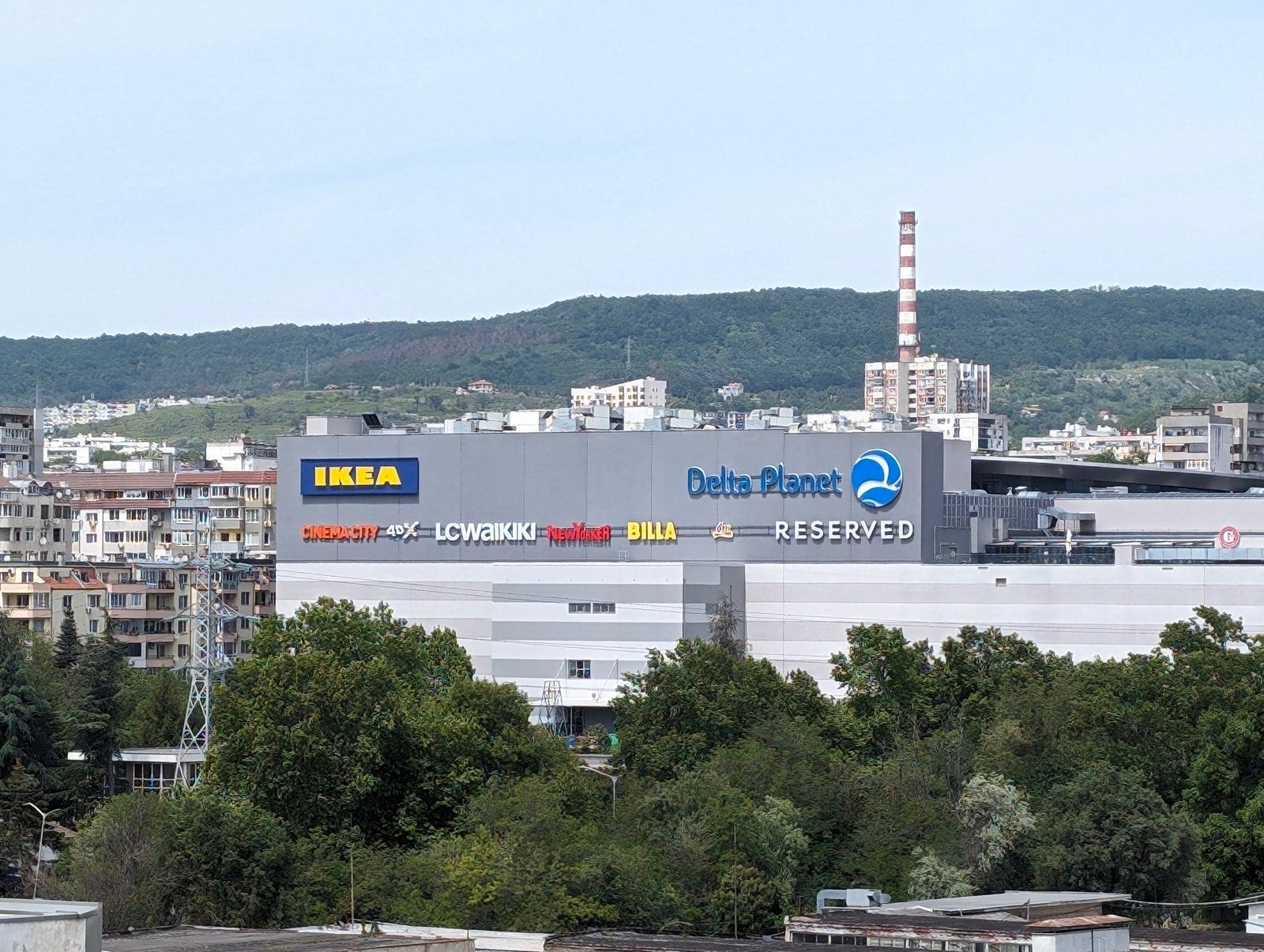


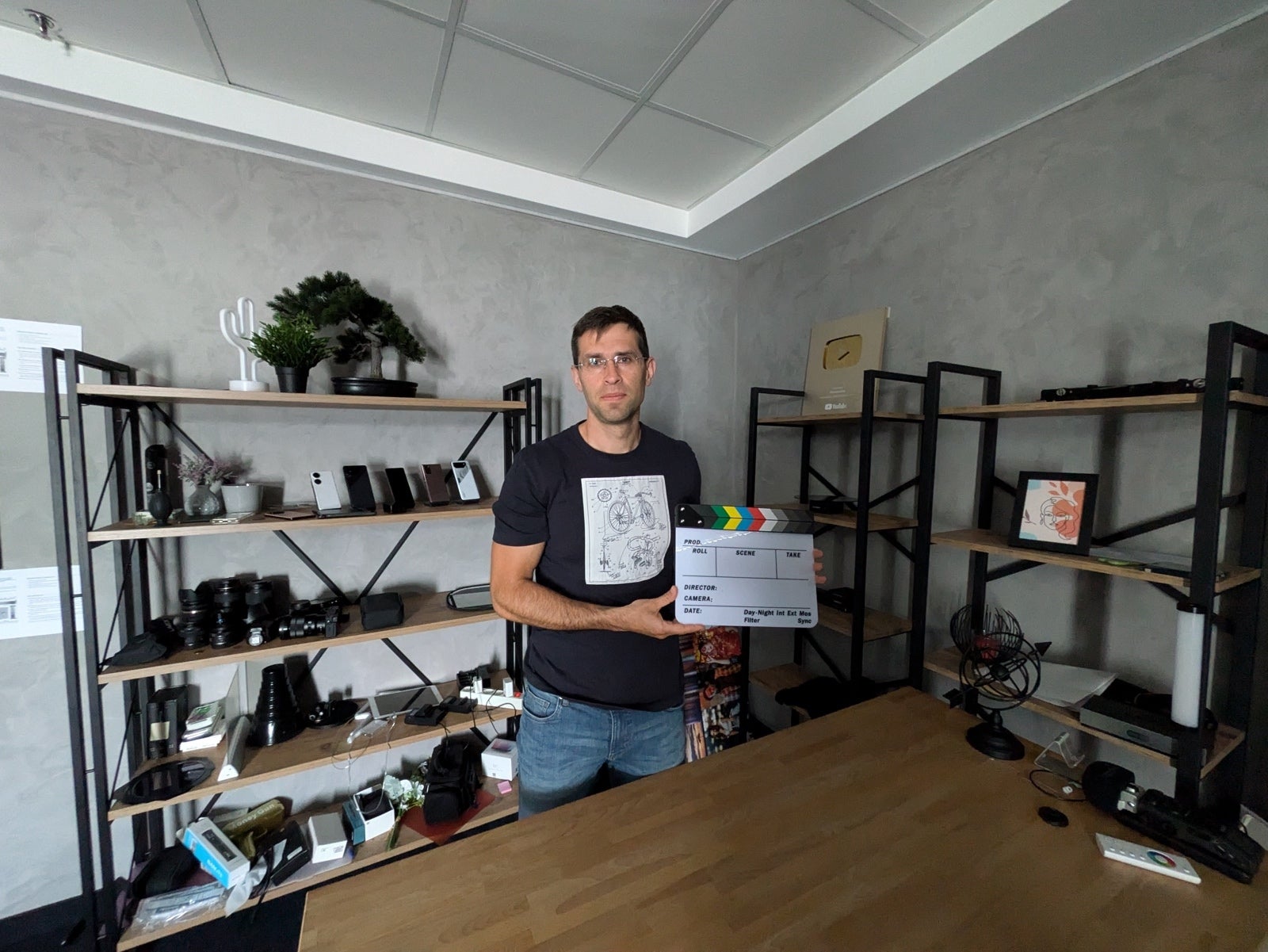
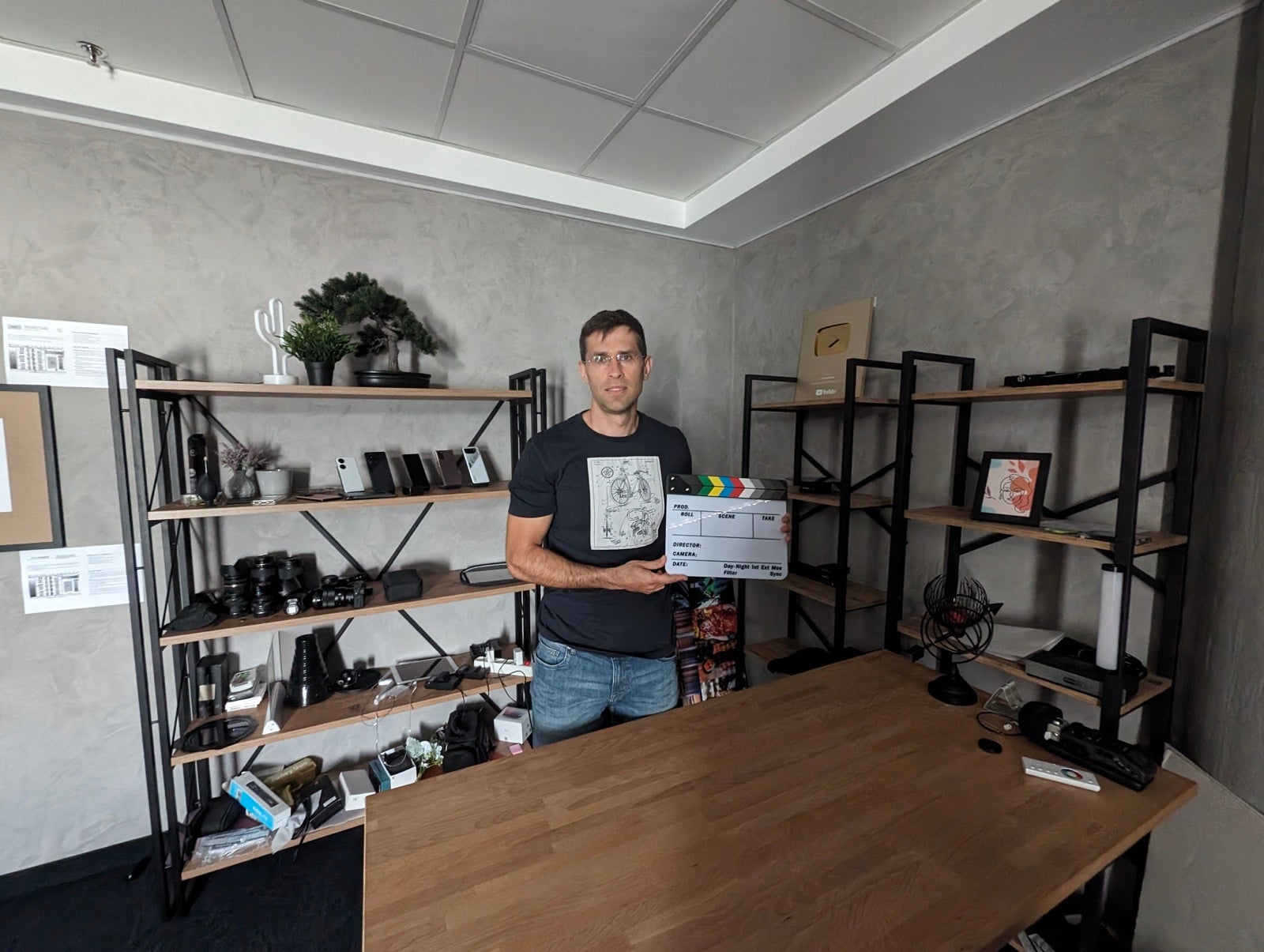



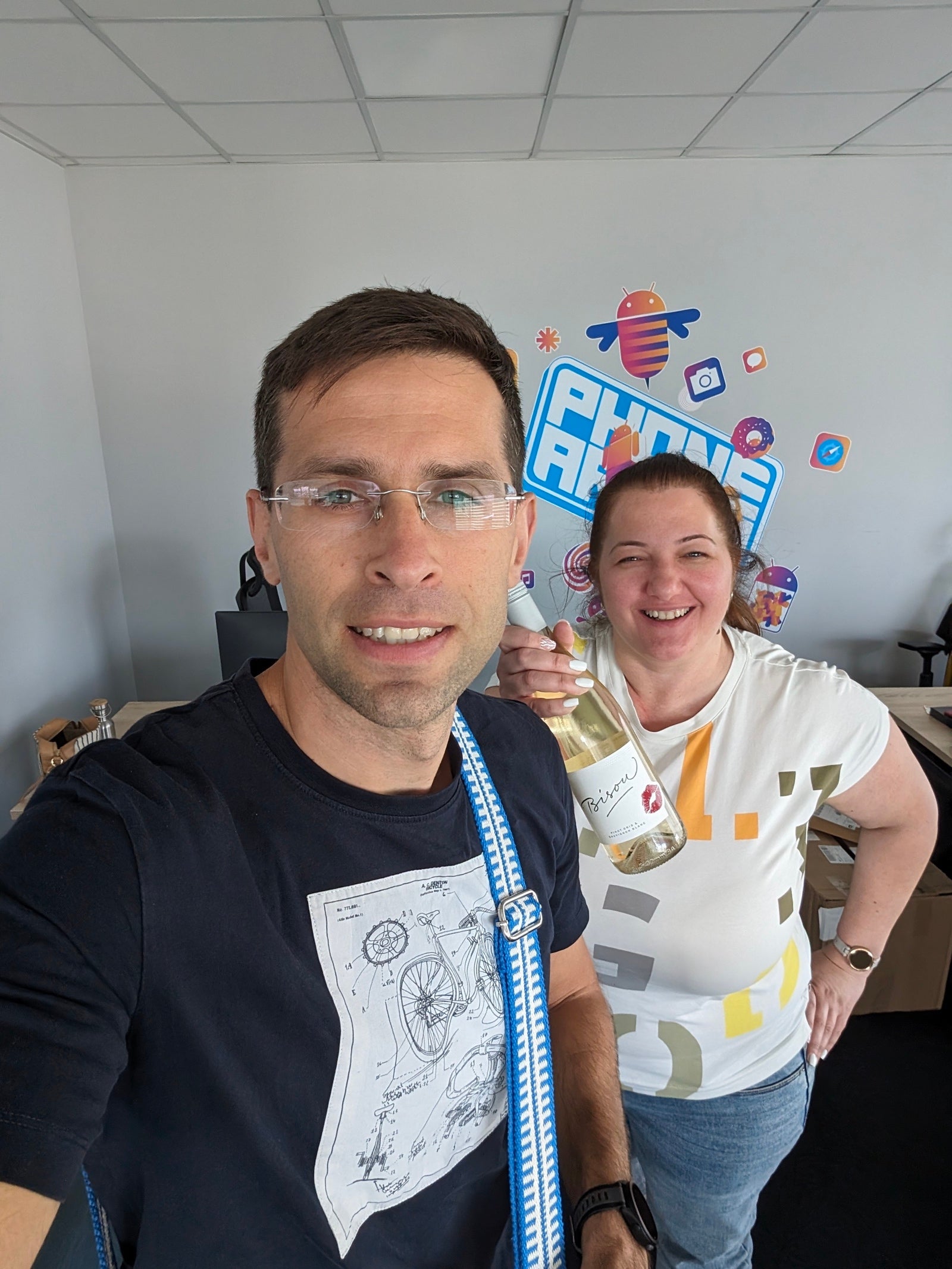



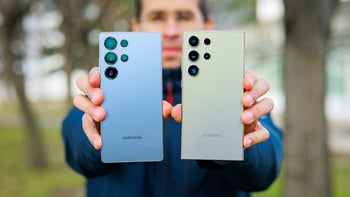

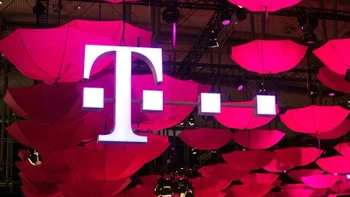


![A new Android bug is making it impossible to install new apps. Are you affected? [UPDATE]](https://m-cdn.phonearena.com/images/article/176703-wide-two_350/A-new-Android-bug-is-making-it-impossible-to-install-new-apps.-Are-you-affected-UPDATE.webp)

Things that are NOT allowed:
To help keep our community safe and free from spam, we apply temporary limits to newly created accounts: